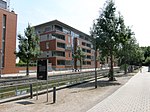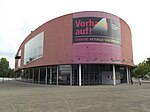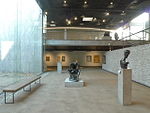Schwanentorbrücke
Bridges in GermanyEuropean bridge (structure) stubsGerman building and structure stubsGermany transport stubsRhine basin ... and 1 more
Transport in Duisburg

The Schwanentorbrücke is a vertical-lift bridge in Duisburg, North Rhine-Westphalia, Germany, that crosses the Duisburg Inner Harbour. The bridge can be vertically raised to allow cargo ships to access the inner city, and lowered to allow cars, trains and pedestrians to cross. The bridge is named after the Schwanenturm (meaning 'watch tower) that protected the city walls in the 13th and 14th centuries.
Excerpt from the Wikipedia article Schwanentorbrücke (License: CC BY-SA 3.0, Authors, Images).Schwanentorbrücke
Schwanentor, Duisburg Kaßlerfeld (Duisburg-Mitte)
Geographical coordinates (GPS) Address External links Nearby Places Show on map
Geographical coordinates (GPS)
| Latitude | Longitude |
|---|---|
| N 51.436230555556 ° | E 6.757825 ° |
Address
Schwanentorbrücke
Schwanentor
47059 Duisburg, Kaßlerfeld (Duisburg-Mitte)
North Rhine-Westphalia, Germany
Open on Google Maps









